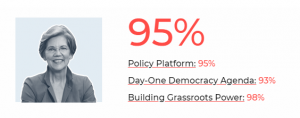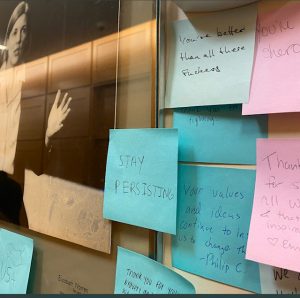Misogyny
Nevertheless, she persisted.
March 5, 2020A Not-So-Super Tuesday
By Connie Schultz
Last week, I sat on a stage in front of more than 200 women in Columbus, Ohio, and tried to answer a simple question.
I don’t remember exactly how interviewer Angela Pace asked it, but I heard it this way: What do you want your granddaughters to remember about you?
To my embarrassment, my eyes teared up and my voice began to quiver.
It’s been such a long three years.
We have seven grandchildren: four boys and three girls. I love them equally, as I made clear that day from the stage. But we were talking less than a week before Super Tuesday, when most political punditry had already congealed around two presumed front-runners, Joe Biden and Bernie Sanders.
Elizabeth Warren, the smart, talented, compassionate senator from Massachusetts, was already invisible, right before their eyes. Like millions of other women, I still see her and the hope she always brings with her. It’s as bright and crystalline as hydrangeas in the dusk’s light, glistening after a soft summer rain.
What do I want my granddaughters to remember about me?
My love for my grandchildren keeps my heart on the brink of combustion, but when I think of Jackie, Carolyn and Ela, ages 5, 4 and 2, something else kicks in; I can’t deny it. I’m old enough to know which dreams died but young enough to remember when I thought they defined who I — who we — would be.
I try never to lead with my injuries, but it’s one thing to work hard to get over a disloyal love. A heart can heal, after all. It’s something quite different when the betrayal never comes to an end.
Once again, it seems, we will have to wait at least another four years to see a woman sworn in as president of the United States.
“It’s not because she’s a woman,” people tell me.
“It’s because she’s that woman,” people tell me.
“It’s because of Hillary’s loss that it feels like a woman couldn’t win,” people tell me.
You can tell me and you can tell me and you can tell me — but let me tell you: There’s not a lie I haven’t heard about what a woman can and cannot do. At my age, every act of sexism and misogyny is an encore production.
Jessica Valenti, a brilliant feminist writer two decades younger than me, wrote this after Super Tuesday, for Medium:
“Even just supporting Warren has come with an unbearable amount of misogynist condescension. I’m tired of being told that I’m a single-issue voter because I care about a candidate’s gender, even if it’s not the only thing I care about. I’m over being made to feel as if representation for half the population isn’t a necessary and radical political position. I don’t appreciate being told that I’m either anti-revolution because I didn’t support Bernie Sanders or unrealistic because I won’t vote for Joe Biden. I especially resent the theory being bandied about that Warren somehow ‘stole’ votes from Sanders; it’s nonsense.”
If you had told me 20 years ago that we’d still be having this conversation about the limitations of women, the only thing I would have allowed you was a running start to get out of my way. Our daughters aren’t much younger than Valenti, which might be why these words of hers took my breath away:
“Whoever the nominee is, their campaign is going to have to come to terms with the intense misogyny so many female voters have dealt with — and understand that it’s an issue we care deeply about. And their supporters are going to have to let us be sad — depressed, even — that once again we’re going to watch a race to leadership between old white men.”
Will we vote for that nominee? Of course, we will, in droves. We love our country.
What do I want my granddaughters to remember about me?
All those little, big things. How much I loved them. How I kept a book of the smart and funny things they said. How I lined our walls with their photos, year after year.
Still, why did I cry?
Maybe it’s because I don’t take for granted that I will live long enough for them to have many memories of me.
Maybe it’s because I hope that, in their toughest moments, long after I’m gone, my persistent opposition to this president’s racism and misogyny will remind them that this is who we are, we women in this family.
Or maybe it’s simpler than that. Maybe I cried because I, too, needed a moment to be sad, after all these years.
Connie Schultz is a Pulitzer Prize-winning columnist and professional in residence at Kent State University’s school of journalism. She is the author of two non-fiction books, including “…and His Lovely Wife,” which chronicled the successful race of her husband, Sherrod Brown, for the U.S. Senate. Her novel, “The Daughters of Erietown,” will be published by Random House in Spring 2020. To find out more about Connie Schultz (schultz.connie@gmail.com) and read her past columns, please visit the Creators Syndicate webpage at www.creators.com.
https://www.creators.com/read/connie-schultz/03/20/a-not-so-super-tuesday
UPDATE
“DREAM BIG. FIGHT HARD.”
Ezra Levin, co-founder and co-executive director of Indivisible Team
“For the record, Warren was the top scoring candidate on Indivisible’s scorecard and would have been an incredible President.”
Elizabeth Warren’s tenured photo in the halls of Harvard University. Supporters and students left their comments for her on the day she suspended her campaign.
Incel: misogynist ideology
April 25, 2018
“Incel Rebellion.” This is not an organized militant group but rather an ideal developed by the so-called “incel” movement — an online community of men united by their inability to convince women to have sex with them. (“Incel” stands for “involuntarily celibate.”)
It’s a new kind of danger, a testament to the power of online communities to radicalize frustrated young men based on their most personal and painful grievances.
The Facebook post “situates the attack as extremist and terrorist,” says J.M. Berger, an expert at the International Center for Counter-Terrorism in the Hague. “Misogyny isn’t new, and ideological misogyny isn’t new. Having a distinct movement that is primarily defined by misogyny is [fairly] novel.”
Many of them are simply sad and lonely men, suffering from extreme social anxiety or deep depression. Some of these moderate incels actively police the extremists in their midst; in a sympathetic 2015 profile, the Washington Post’s Caitlin Dewey reported that some incel forums were set up to automatically delete any posts referencing the California shooter.
But many incels have a much more sinister, and specific, worldview — one that the Southern Poverty Law Center sees as part of a dangerous trend toward male radicalization online. These incels post obsessively about so-called “Chads,” meaning sexually successful and attractive men, and “Stacys,” attractive, promiscuous women who sleep with the Chads. Both are positioned as unattainable: The Chad is the masculine ideal, one incel men cannot emulate for reasons of poor genetics, while the Stacy is whom every incel man wants to sleep with but cannot because they aren’t a Chad.
This is how inceldom becomes a political doctrine: They see themselves as a class, oppressed by a social system that’s rigged in favor of other men. One post on an incel subreddit compared their worldview to Marxism, with incels playing the part of the proletariat and Chad the bourgeoisie. The natural corollary of this idea is clear: If the root of the problem is an unfair social system, then there needs to be a revolution to change it.
Does this mean we should just throw up our hands and say that the radicalization of some young men toward violent misogyny is inevitable? Of course not. Carvin suggests that social outreach programs, focusing on countering the sense of isolation that draws young men to these communities in the first place, might be a better idea than standing up a potential counter-incel task force at the FBI. (No such group is currently known to exist.)
But regardless of what the right solution is, we need to be clear-eyed about the type of challenge we’re facing. The internet makes it easier than ever for sad and angry people to find each other and develop communities with weird and dangerous ideologies. What we’re seeing right now is one of society’s oldest hatreds, misogyny, being reworked in real time to fit a specific group of men’s rage and pain.
VOX
By Zack Beauchamp
zach@vox.com
Full article:
https://www.vox.com/world/2018/4/25/17277496/incel-toronto-attack-alek-minassian




